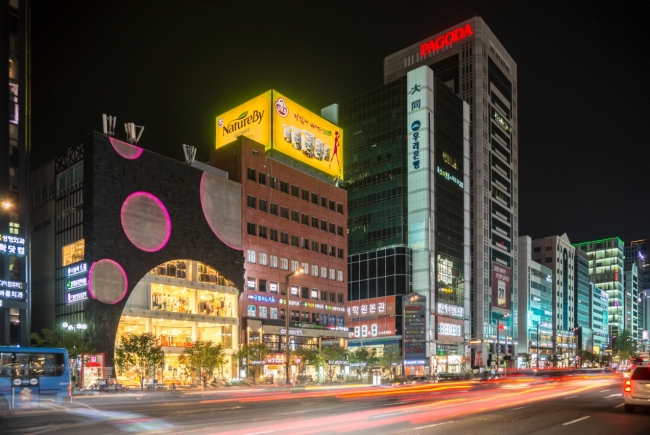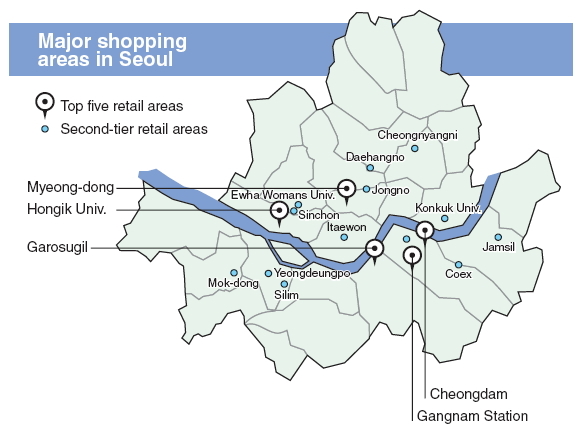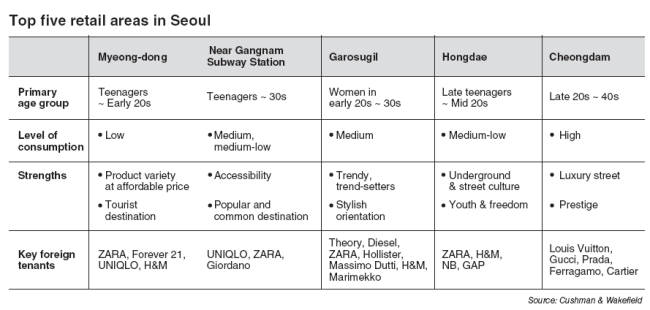Global retailers test out Seoul shopping streets
Korean capital an Asian test-bed market for chains such as H&M, Zara
By Seo Jee-yeonPublished : Oct. 29, 2013 - 19:39

“Commercial and retail streets, better known as high streets in the U.K., have emerged as a key sales and marketing channel for foreign retail brands in Korea since the mid 2000s, when more young Korean consumers started looking for brands to express their own fashion and style beyond brands in department stores,’’ said Kelly Nam, an assistant manager of the Korean branch of Cushman & Wakefield, a New York-based real estate consulting firm.
Targeting these new customer breeds in Korea, international brands including H&M, Zara, Forever 21 and Uniqlo spring-boarded into the Korean “high street” market by setting up shop in major commercial areas in Seoul, particularly in Myeong-dong, central Seoul, and near Gangnam Station in southern Seoul ― the top two high streets in Seoul in terms of customer traffic and accessibility.

According to Cushman & Wakefield, Gangnam-daero street near Gangnam Station, Exit 10, was the most popular destination for fashion labels this year, beating Myeong-dong, a shopping mecca for tourists. Most of the leading foreign and local fashion labels are lined up on the most expensive area on Gangnam-daero.
Test bed for global retail brands

“Boosted by the business success of international fashion brands in Korea, inquiries from European boutique-type fashion brands and American food and beverage chains on high streets in Seoul is on the rise,’’ said Ryan Kim, a manager of Cushman & Wakefield Korea.
“One of the reasons they are keen on building up on Korean high streets is because Korea is considered a test-bed market for retail brand chains in Asia,’’ Kim added.
According to Kim, success in Korea, with its sophisticated, trend-setting customers, acts as a barometer for global retail brands to decide whether to enter other bigger Asian markets like China.
Cushman & Wakefield Korea forecast that more diversified foreign retail brands will flock to Korea’s commercial streets over the next few years, changing their landscape.
“There is still room for growth in leading high streets in Seoul as these streets continue to expand to adjacent areas, creating more customer traffic,’’ Kim said.
Riding on the growth projection, the U.S. real estate solution provider has expanded its Korean retail transaction team focusing on foreign and domestic retail brands.
“The retail team of Cushman & Wakefield Korea, which supports foreign and domestic retail clients to look for store locations on high streets or mega shopping malls in Korea, has grown by around 50 percent per year for the past three years,’’ Dan Kim, a director of Cushman & Wakefield, said.
Regulatory challenges
One of the biggest challenges ahead of global retail brands who consider opening stores on Korean high streets is not rental cost, but a different regulatory environment, Kim said.
According to him, the brand stores would require more than 1,000 square meters of space in general. When they rent an office building and transform it into a brand store building, they have to spend extra due to a regulation applied to commercial buildings bigger than 1,000 square meters.
“The regulation requires large-scale commercial buildings to secure more parking spaces and more facilities for the physically challenged and other customer groups than smaller buildings,’’ said Kim, who supported international SPA brands like H&M and Zara to open their first brand shop in Korea, adding that Korea also requires a higher deposit for tenants than other countries.
“Despite different regulatory environments in Korean real estate market, the rental cost at buildings here is cheaper than other Asian tourist destinations like Hong Kong and Singapore,’’ he added.
By Seo Jee-yeon (jyseo@heraldcorp.com)








![[KH Explains] Hyundai's full hybrid edge to pay off amid slow transition to pure EVs](http://res.heraldm.com/phpwas/restmb_idxmake.php?idx=644&simg=/content/image/2024/04/18/20240418050645_0.jpg&u=20240419100350)






![[From the Scene] Monks, Buddhists hail return of remains of Buddhas](http://res.heraldm.com/phpwas/restmb_idxmake.php?idx=652&simg=/content/image/2024/04/19/20240419050617_0.jpg&u=20240419175937)

![[KH Explains] Hyundai's full hybrid edge to pay off amid slow transition to pure EVs](http://res.heraldm.com/phpwas/restmb_idxmake.php?idx=652&simg=/content/image/2024/04/18/20240418050645_0.jpg&u=20240419100350)

![[Today’s K-pop] Illit drops debut single remix](http://res.heraldm.com/phpwas/restmb_idxmake.php?idx=642&simg=/content/image/2024/04/19/20240419050612_0.jpg&u=)